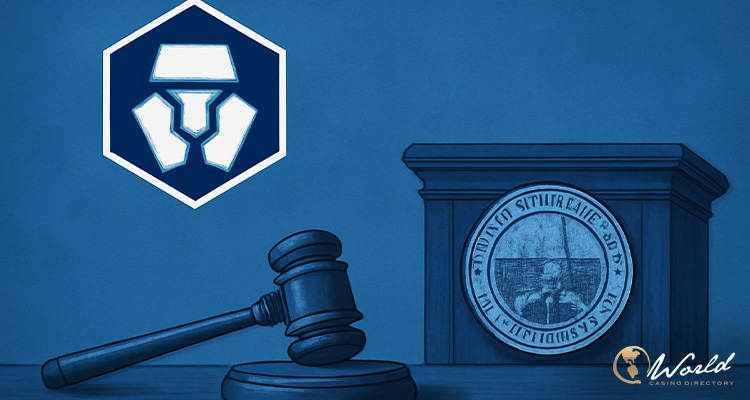Crypto.com, the digital asset exchange, has escalated a legal battle against the Nevada Gaming Control Board (NGCB) by filing a lawsuit in federal court. The company is contesting the NGCB’s decision to block its trading of sports event contracts, asserting that such contracts are governed by federal law and not subject to state gaming regulations.
A legal showdown over federal vs. state authority:
At the heart of the lawsuit is the jurisdictional conflict between federal and state law. Crypto.com, through its North American Derivatives Exchange (NADX), argues that its sports-related financial contracts are regulated by the Commodity Futures Trading Commission (CFTC) under the Commodity Exchange Act. The exchange insists that the CFTC has exclusive authority over these products, and thus the NGCB cannot interfere, as its jurisdiction is limited to state-level gambling activities.
The issue arose after Nevada’s gaming regulators sent Crypto.com a cease-and-desist letter on May 20, 2025. This letter demanded that the exchange halt offering its event-based contracts to Nevada residents, threatening both criminal and civil penalties if the company failed to comply. Crypto.com is now seeking a federal court ruling to block the NGCB’s enforcement of state gaming laws, arguing that such actions would violate federal preemption principles.
Crypto.com maintains that the sports event contracts it offers are entirely compliant with federal law and cannot be treated as illegal sports wagering under Nevada’s state gambling regulations. The exchange points to past legal precedents, notably cases involving prediction marketplace KalshiEX, where federal courts ruled in favor of the CFTC’s authority over state gaming regulators. In these previous rulings, courts confirmed that the Commodity Exchange Act preempts state laws when it comes to federally regulated event contracts.
“We firmly believe that the CFTC is the appropriate body to oversee these markets, and state authorities like the NGCB do not have the jurisdiction to regulate these contracts,” the lawsuit states, as reported by Cointelegraph. “The NGCB’s actions represent an unlawful overreach and cause significant harm to our business.”
The lawsuit further emphasizes that enforcing Nevada’s gaming rules would require Crypto.com to impose geo-blocking measures on Nevada residents, which would directly conflict with federal guidelines that ensure access to these financial instruments is impartial and available nationwide.
The precedent set by KalshiEX and similar cases:
The legal battle between Crypto.com and the NGCB is part of a larger conflict involving federally regulated prediction markets. In recent months, KalshiEX, another provider of event-based contracts, faced similar challenges from Nevada and New Jersey gaming regulators. Courts ruled in KalshiEX’s favor, acknowledging the CFTC’s exclusive jurisdiction over event contracts and preventing state authorities from imposing their own regulations.
Crypto.com has leaned heavily on these favorable rulings, particularly the decision involving KalshiEX in Nevada, where U.S. District Judge Andrew Gordon blocked state authorities from taking enforcement actions against the platform. In the Kalshi case, the court determined that the federal Commodity Exchange Act took precedence over state gaming laws, setting a clear legal precedent that Crypto.com is now invoking.
In its lawsuit, Crypto.com is seeking two key legal remedies: a permanent injunction to prevent the NGCB from enforcing Nevada’s gaming laws against its federally regulated derivatives business and a declaratory judgment affirming that federal law preempts state gaming regulations. The exchange is also asking the court to confirm that its event contracts, which cover predictions on various sports outcomes, are lawful under federal jurisdiction and cannot be prohibited by state authorities like the NGCB.
The conflict between state gaming authorities and federally regulated platforms like Crypto.com is indicative of the broader challenges in the evolving landscape of digital finance and online gaming. As more states explore regulation of prediction markets and event contracts, the issue of jurisdictional authority is likely to remain a central theme in legal disputes.
Crypto.com’s legal team has expressed confidence that the federal courts will uphold the principles of federal preemption, citing the success of similar challenges and the established authority of the CFTC. The company’s stance is that any state-level interference would not only harm its business but also undermine the integrity of federally regulated markets across the United States.


